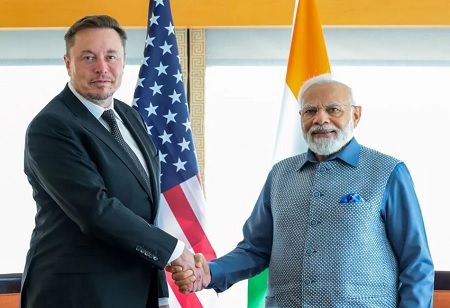
PM Modi's Push Poised to Drive Tesla's Entry into India, Eyes Factory Land

 After Prime Minister Narendra Modi's 2015 visit to the Tesla facility in Palo Alto, California, where he was given a tour by Elon Musk, the tech billionaire is now sending a team to scout for a potential location in India to establish a $2-$3 billion electric vehicle plant, marking Tesla's imminent entry into the Indian market.
After Prime Minister Narendra Modi's 2015 visit to the Tesla facility in Palo Alto, California, where he was given a tour by Elon Musk, the tech billionaire is now sending a team to scout for a potential location in India to establish a $2-$3 billion electric vehicle plant, marking Tesla's imminent entry into the Indian market.
Reports say that on top of the Tesla CEO’s mind are three states Gujarat, Maharashtra, and Tamil Nadu which have an EV infrastructure in place, as well as ports that make it easier for the electric car giant "to export cars". The credit goes to PM Modi’s persistent efforts in convincing Musk to look at India as his next big destination to establish a Tesla Gigafactory and export EVs to the rest of the world. In June last year, PM Modi met Musk in the US and appreciated his efforts at making technology accessible and affordable in various sectors.
Following an invitation from the Prime Minister to explore investment opportunities in India's electric mobility sector, Elon Musk initiated efforts to establish his own supply chain ecosystem in the country. This move aims to facilitate the production of more affordable electric cars, potentially starting at Rs 20 lakh, after their meeting.
PM Modi "really wants to do the right thing for India. He wants to make sure that the advantage from investments accrues to India's advantage, which is, you know, obviously, that's the job", the billionaire told reporters after meeting the PM.
Under the recent EV policy unveiled last month by the Modi-led government, customs duty has been lowered to 15 percent, albeit subject to specific conditions. Setting up EV manufacturing facilities will require a minimum investment of Rs 4,150 crore (approximately $500 million), with production slated to commence within three years. Additionally, the policy mandates achieving a 25 percent domestic value addition (DVA) within three years and 50 percent DVA within a maximum of five years.
With these developments, the path is cleared for Musk's entry into the Indian market. Projections suggest that India's EV sector could witness over 40 percent penetration, generating revenue exceeding $100 billion by 2030. This growth trajectory is anticipated to be fueled by significant adoption in the two-wheeler and three-wheeler segments, while four-wheeler penetration is expected to surpass 20 percent, as per a report.
India's advancements in constructing its EV charging infrastructure align with efforts to phase out diesel vehicles within a specified timeframe. Furthermore, government schemes such as the Faster Adoption and Manufacturing of (Hybrid &) Electric Vehicles (FAME) initiative have provided additional incentives to encourage the adoption of EVs.